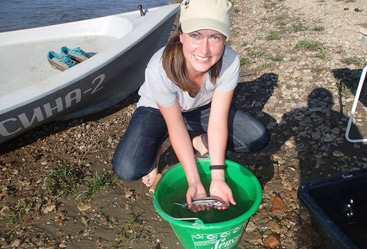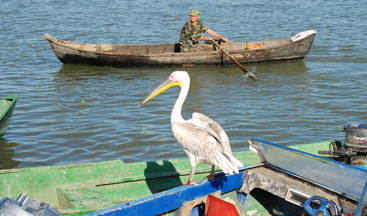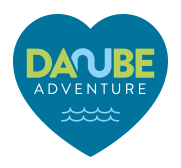Danube Watch 2/2016 - Restoring vital wetlands for nature and people alike
Restoring vital wetlands for nature and people alike
The first results can be seen from the Living Danube Partnership, a seven-year, six-country programme to reconnect floodplains in the region.

A WWF expert holds a Danube sturgeon, one of the species that has benefited from the programme’s aim to The aim is to restore habitats and remove migration obstacles.
© WWF
The Danube, which is the European Union’s longest river, has seen 80% of its floodplains and wetlands disappear due to human interventions over the past 150 years. The result has been plummeting fish stocks and wildlife populations, and decreasing water quality and ability to absorb floodwaters.
On the eve of Danube Day, 29 June, WWF and The Coca-Cola Company announced the annual progress of their seven-year Living Danube Partnership to restore vital wetlands and floodplains along the Danube River by 2020. The Living Danube Partnership directly contributes to one-third of the objectives of Danube countries to restore 151.3 km2 of floodplain and wetland areas by 2021.
Over the restoration period, measures such as opening dykes and dams to reconnect former floodplains and improve flooding capacity, restoring the wetland habitats of animal and plant species and building a fish pass will be funded with a grant from The Coca-Cola Foundation.
“Together, WWF and The Coca-Cola Foundation – alongside local authorities and organisations in the countries that the Danube River passes through – have begun restoring these vital wetlands and floodplains for the benefit of people and nature, with first results at Neusiedler See in Austria and Siroki Rit in Serbia,” said Andreas Beckmann, Director of the WWF Danube-Carpathian Programme.
To raise awareness of the importance of wetlands and their conservation and restoration, the Living Danube Tour of WWF and Coca-Cola has visited more than 36 locations across Austria, Bulgaria, Croatia, Hungary, Romania, Slovakia, Slovenia and Serbia, reaching over 60,000 people directly.
“We recognise that water is a scarce resource. It’s also the primary ingredient in our products. That’s why we are committed to continually improving how efficiently we use water, working with WWF to set ourselves ambitious global targets,” said Sofia Kilifi, Public Affairs & Sustainability Manager at Coca-Cola Central & Southern Europe. “We’ve been working with the WWF since 2007 to help conserve freshwater resources around the world and to make meaningful changes to our business."

The partnership is working with local fishermen to sustain biodiversity.
© WWF/Cristian Mititelu
What has been achieved so far in each of the six countries:
Austria
In Austria, the project has restored some of the last soda lakes, a unique habitat next to the Neusiedler See, threatened by poor drainage channels and consequently by lower groundwater levels. The aim of the project was to build weirs to raise the groundwater table to former levels, bringing up to 1,000,000 m3 of water back to nature. The activities benefit local tourism, dependent on the abundance of birds, as well as agriculture, which has also suffered from the low groundwater level.
Bulgaria
In Bulgaria, the project focuses on the Lower Danube Green Corridor, one of Europe’s most ambitious wetland protection and restoration initiatives. The aim is to restore over 30 km of river habitats that are home to six threatened and endangered fish species by removing migration obstacles and building a fish pass. Other conservation activities include marking and restocking to help improve the river’s ecological status. Anglers have been educated about the value of river connectivity. Another wetland restoration project in Bulgaria is in the pipeline.
Croatia
The project focuses on restoration activities along the Drava River, part of the future five-country Mura-Drava-Danube Trans-Boundary Biosphere Reserve, referred to as 'Europe’s Amazon'. The aim is to restore or recreate seven side-arms that will improve natural river dynamics and habitats, flood risk mitigation, ecotourism and recreation. This is Croatia’s first EU LIFE Nature project. It was officially launched on 17 June 2016.
Hungary
The project focuses on restoration work along the Barcs-Old-Drava former meander, in cooperation with Croatia. The area is also part of the future five-country Mura-Drava-Danube Trans-Boundary Biosphere Reserve. This is the longest natural riverside lake in Hungary, spanning 15 km. The restoration demonstrates a relatively simple and cost-effective way of improving the ecological status of the wetlands and surrounding forests, and developing recreation with new angling platforms. Another restoration project along the Danube is also envisaged.
Romania
The project will restore the former Garla Mare Fish Farm along the Danube. WWF has already become one of the custodians of the Natura 2000 site there. The aim is to connect the transformed wetlands to the natural flood pulse of the river Danube. This will improve the river’s retention capacity in the event of future flooding and provide ground for sustainable land use such as grazing or bee keeping. Further wetland restoration projects in Romania are also planned.
Serbia
The project restores the Siroki Rit wetland which will be finished in 2017. The area lies on the Danube floodplain, but was disconnected from the river by dykes. The aim is to improve the water regime throughout the year. The team has already received a government award for the restoration works implemented.







